아이의 창의력과 상상력을 키워주고 싶으신가요? 재미있고 흥미로운 상상 놀이 방법을 찾고 계신가요? 극적인 놀이 아이디어가 아이의 사회성, 정서, 인지 능력 발달에 어떻게 도움이 될까요?
극놀이 아이디어는 어린아이들의 창의력을 키우는 가장 강력한 도구 중 하나입니다. 극놀이는 아이들이 새로운 역할을 탐구하고, 감정을 표현하고, 재미있게 놀면서 문제 해결 능력을 키울 수 있는 공간을 제공합니다. 상상력이 풍부한 상황을 일상생활에 접목하면 아이가 주변 세상을 더 잘 이해하는 데 도움이 될 수 있습니다.
다음 기사에서는 어린이의 극적 놀이의 많은 이점을 알아보고, 어린이를 위한 풍부하고 매력적인 환경을 조성하는 창의적인 극적 놀이 아이디어와 팁을 제공합니다.
극적극이란 무엇인가?
극놀이는 가상 놀이 또는 역할극이라고도 하며, 아이들이 상상력을 발휘하여 실제 또는 가상의 상황을 시뮬레이션하는 활동입니다. 의사, 교사, 소방관 등의 직업을 연기하거나, 부모, 형제자매 등의 사회적 역할을 흉내 내거나, 슈퍼히어로, 해적, 판타지 생물 등 완전히 가상의 세계를 구성하는 활동 등이 포함될 수 있습니다. 극놀이 아이디어는 신체 움직임, 언어 표현, 소품이나 의상을 활용하는 개인 또는 그룹 활동으로 구성될 수 있습니다.
~ 안에 극적 연극아이들은 종종 역할을 맡아 보고, 듣고, 상상했던 이야기나 경험을 연기합니다. 이를 통해 아이들은 다양한 관점을 탐구하고, 감정을 표현하고, 사회적 규범과 행동을 연습할 수 있습니다. 예를 들어, 아이들이 부모 역할을 연기할 때 양육 행동을 흉내 내는 것은 공감과 책임감을 이해하는 데 도움이 됩니다.
What are the Types of Dramatic Play?
Dramatic play is generally categorized into two primary types based on how guided or open-ended the experience is: Structured and Unstructured. Both types are essential in early childhood development and offer distinct benefits to a child’s learning journey.
구조화된 극적 연극
Structured dramatic play refers to adult-guided, theme-specific, or goal-oriented pretend play experiences. In this type of play, children are provided with specific roles, props, rules, or objectives to follow. It is commonly used in classroom settings to meet targeted learning outcomes.
Key Features:
- Often aligned with curriculum goals (e.g., a hospital to learn about community helpers).
- Involves adult facilitation or direction.
- May include scripted elements or planned tasks.
- Focuses on specific vocabulary, routines, or skills.
Examples:
- A “Post Office” play setup with labeled envelopes, delivery logs, and assigned roles.
- Reenacting a story like The Three Little Pigs with props and guided dialogue.
- A teacher-led “Restaurant” where children follow a menu, take orders, and practice counting money.
Educational Benefits:
Structured play enhances language acquisition, social routines, role comprehension, and supports cross-curricular learning in subjects like math, science, or social studies.
비구조화된 극적 연극
Unstructured dramatic play is child-initiated, spontaneous, and open-ended, allowing children complete freedom to create their own stories, roles, and worlds. This is the most natural and intuitive form of play, especially in home or free-choice classroom environments.
Key Features:
- Driven entirely by the child’s imagination and interest.
- Lacks fixed goals, rules, or teacher-imposed scripts.
- Props and materials may be improvised or symbolic.
- Often fluid and adaptable, roles can change at any time.
Examples:
- A child pretending a stick is a magic wand while becoming a wizard in the backyard.
- Siblings are creating a pretend school with stuffed animals as students.
- Free play where costumes, pillows, or boxes become part of a made-up world.
Educational Benefits:
Unstructured play strengthens creativity, problem-solving, emotional expression, and flexible thinking. It encourages independence and allows children to process real-life experiences symbolically.
극적 연극의 이점
극적 놀이 아이디어는 단순한 재미를 넘어, 아이의 발달 과정에 중요한 요소입니다. 극적 놀이의 주요 이점은 다음과 같습니다.
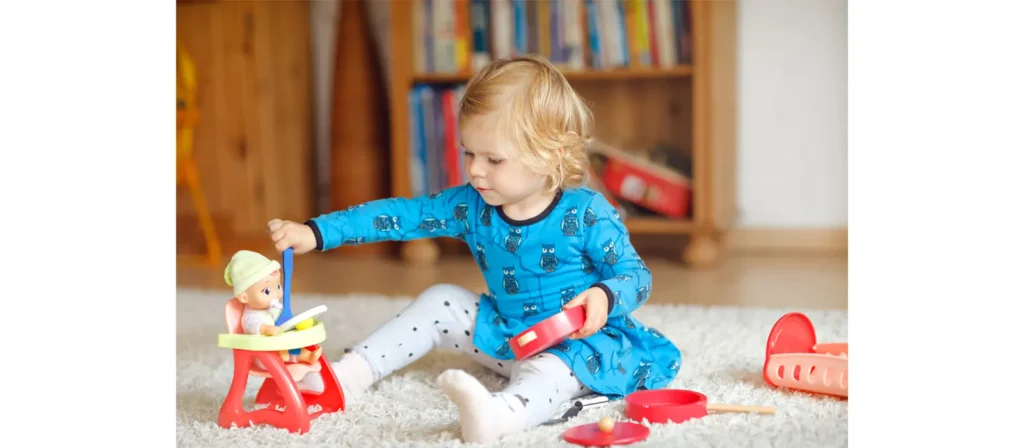
1. 인지 발달
- 문제 해결 기술: 아이들은 연극 놀이를 할 때 종종 창의적인 해결책이 필요한 문제에 직면합니다. 예를 들어, 식당을 운영하는 역할을 맡는다면, 손님을 어떻게 앉히고, 주문을 받고, 음식을 배달하는지 알아내야 합니다. 이는 아이들의 비판적 사고력과 문제 해결 능력을 향상시킵니다.
- 기억과 회상: 가상 놀이는 기억력 강화에 매우 효과적인 도구입니다. 아이들은 익숙한 상황을 연기하면서 연극 의상과 소품을 활용하여 이야기나 실제 경험을 떠올리고, 이를 통해 단기 기억과 장기 기억을 강화합니다.
- 추상적 사고: 아동 발달 센터의 연극 놀이는 상징적 사고를 촉진합니다. 단순한 막대기가 칼이 되고, 상자가 우주선이 되고, 담요가 망토가 될 수 있습니다. 이러한 추상적인 표현은 아이들의 상상력과 창의력을 발달시키는 데 도움이 됩니다.
2. 사회적, 정서적 발달
- 공감과 관점 수용: 역할극을 통해 아이들은 다른 사람의 입장이 되어 봅니다. 예를 들어, 아이들이 연극 놀이에서 부모나 선생님 역할을 할 때, 다양한 감정과 행동을 이해하게 됩니다. 다른 사람들이 어떻게 느낄지 상상하고 다양한 사회적 상황에서 어떻게 반응해야 할지 생각하면서 공감 능력을 배웁니다.
- 감정 조절: 극적 놀이 아이디어는 종종 무서움, 슬픔, 흥분을 연기하는 것처럼 감정을 표현하는 것을 포함합니다. 이는 아이들에게 건강한 감정 표현의 기회를 제공하고, 실생활에서 자신의 감정을 조절하는 방법을 이해하는 데 도움이 됩니다.
- 사회적 기술: 아이들은 집단 극놀이에 참여하면서 의사소통, 협동, 협상, 갈등 해결 능력을 키웁니다. 이러한 기술은 우정을 쌓고 사회적 상황을 잘 헤쳐나가는 데 매우 중요합니다.
3. 언어 발달
- 어휘 확장: 극적 놀이를 통해 아이들은 새로운 단어와 표현을 배우게 되는데, 특히 "손님", "주문", "메뉴", "비상"과 같이 특정 역할이나 상황과 관련된 단어와 표현을 배우게 됩니다. 새로운 어휘를 자주 사용함으로써 언어 능력을 기르는 데 도움이 됩니다.
- 스토리텔링 및 내러티브 기술: 가상 놀이는 아이들이 시작, 중간, 끝으로 이야기를 구성하는 방법을 이해하는 데 도움이 됩니다. 새로운 시나리오와 이야기를 구성하는 창의력을 키우고 스토리텔링 능력을 향상시킵니다.
- 의사소통: 역할극을 통해 아이들은 자신의 생각, 아이디어, 계획을 또래와 소통해야 하므로, 연극 놀이 아이디어는 언어 표현을 장려합니다. 이를 통해 생각을 표현하고 의미 있는 대화에 참여하는 능력이 향상됩니다.
4. 운동 발달
- 대근육 운동 기술: 활동적이지 않은 극적 놀이의 한 형태로, 아이들은 달리고, 뛰고, 오르고, 춤을 추면서 큰 근육군을 발달시킬 수 있습니다.
- 미세 운동 기술: 작은 물건과 같은 연극 장난감을 다루거나, 연극 의상을 입거나, 소품을 정리하는 것은 소근육 운동 능력을 향상시키는 데 도움이 됩니다. 이러한 활동은 또한 손재주와 손과 눈의 협응력을 향상시킵니다.
집이나 유치원에서 극적 놀이를 장려하는 방법
가정이나 교실에서 극적 놀이를 하려면 상상력과 역할 수행을 장려하는 환경을 조성해야 합니다. 몇 가지 전략을 소개합니다.

놀이 공간 설정
지정된 구역을 만드세요 아이들이 연극 놀이에 참여할 수 있는 곳입니다. 의상, 소품, 그리고 주방용품, 도구, 인형 같은 테마 아이템이 있는 아늑한 공간은 아이들의 창의력을 자극할 수 있습니다. 예를 들어, 작은 테이블과 의자, 놀이 음식, 메뉴판이 있는 공간은 아이들이 운영하는 레스토랑으로 탈바꿈할 수 있습니다.
개방형 자료 제공
아이들은 극적인 놀이를 위해 비싼 장난감이 필요하지 않습니다. 골판지 상자, 헌 옷, 천, 주방용품, 깨지지 않는 생활용품 등 자유롭게 활용할 수 있는 재료를 준비하세요. 이러한 재료들은 아이들이 창의력을 발휘하여 자신만의 시나리오를 만들어낼 수 있도록 도와줍니다.
개방형 소품의 예:
| 일상용품 | 극적인 활용 |
|---|---|
| 스카프 | Costumes, capes, picnic blankets, and royalty accessories |
| 골판지 상자 | 우주선, 주방, 성 |
| 나무 숟가락 | 마이크, 마법봉, 드럼스틱 |
| 오래된 전화기 | 비즈니스 플레이, 병원 진료, 인터뷰 |
감독이 아닌 격려자가 되십시오
극적 놀이를 장려하는 것은 중요하지만, 놀이를 주도하거나 주도하는 것은 피해야 합니다. 아이들은 어른의 과도한 개입 없이 자유롭게 상상력을 발휘할 수 있어야 합니다. 필요하다면 "의사 선생님이 다음에 어떻게 하실 것 같아요?" 또는 "이 문제를 어떻게 함께 해결할 수 있을까요?"와 같이 개방형 질문을 통해 아이들이 창의적으로 생각하도록 격려하고 부드럽게 이끌어 주세요.
간단한 테마와 시나리오 소개
아이들이 시작하는 데 약간의 도움이 필요하다면 다음과 같은 간단하고 공감할 수 있는 주제를 소개하세요.
- 병원에 가다
- 식료품 쇼핑
- 빵집을 운영하다
- 우주 탐험
- 동물원 방문
이러한 주제는 친숙하고, 역할극을 하기 쉽고, 언어 발달과 문제 해결 기회가 가득합니다.
모델 연극
어른들은 아이들에게 극적 놀이 아이디어를 시범으로 보여주며 놀이의 원리를 보여줄 수도 있습니다. 등장인물 역할을 하거나 역할극을 함께 하면서, 어른들은 새로운 아이디어를 놀이에 접목하는 방법을 보여줄 수 있습니다.
그룹 놀이 기회 제공
극놀이는 개별 활동일 수도 있지만, 아이들이 함께 협력할 때 더욱 풍성해집니다. 아이들이 함께 협력하고 역할을 나눌 수 있는 놀이 모임이나 교실 활동을 마련하여 모둠 놀이를 장려하세요. 이를 통해 사회적 상호작용과 의사소통 능력을 키울 수 있습니다.
신선함을 유지하기 위해 소품을 바꿔보세요
흥미와 호기심을 유지하려면 장난감과 소품을 정기적으로 바꿔주세요. 소방관 모자가 잠시 사라졌다가 다시 나타나면 갑자기 새것처럼 느껴집니다. 이렇게 하면 지루함을 방지하고 별다른 노력 없이도 놀이에 활력을 불어넣을 수 있습니다.
제품이 아닌 과정을 축하하세요
공예나 퍼즐과는 달리, 극놀이는 결과가 아니라 경험에 관한 것입니다. 가장하는 데에는 옳고 그름이 없습니다. 따라서 성과나 완성도에 집중하는 대신, 창의력, 협력, 그리고 상상 속 놀이의 순수한 즐거움을 기념하세요.
26 Creative Dramatic Play Ideas
극놀이는 아이들이 다양한 역할에 몰입하고, 창의력을 발휘하며, 실생활에서 필요한 기술을 연습할 수 있도록 도와줍니다. 상상력 넘치는 놀이를 장려하기 위해 아이들은 극놀이 아이디어를 좋아할 것입니다!
1. Pretend Play Kitchen Dramatic Play Ideas
- 작은 테이블을 주방 카운터로 사용하고, 골판지 상자를 스토브나 냉장고로 사용하고, 플라스틱 접시와 식기를 장난감 식사 도구로 활용하세요.
- 가상 요리와 베이킹 놀이를 위해 빈 용기, 계량컵, 장난감 베이킹 도구를 준비하세요.
- 역할극을 위해 앞치마와 요리사 모자를 추가하고, 가상 메뉴를 만들고, "싱크대"와 "냉장고"와 같이 각 구역에 이름을 붙이세요.
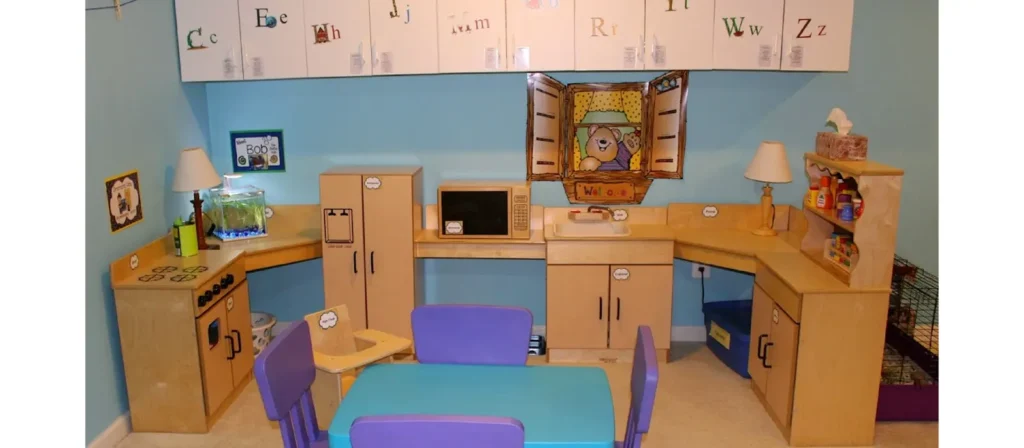
교육적 가치:
Pretend kitchen play enhances cognitive sequencing and symbolic thinking as children plan and prepare imaginary meals. It supports language development by encouraging the use of cooking-related vocabulary and conversational role-play. Fine motor skills are strengthened through the manipulation of utensils, containers, and tools. Additionally, it nurtures social cooperation, responsibility, and turn-taking during collaborative scenarios.
2. 꽃집 연극 아이디어
- 알록달록한 조화, 티슈 페이퍼 꽃, 또는 진짜 식물을 사용해 보세요. 꽃병이나 바구니에 꽂아 두면 더욱 좋습니다.
- 꽃에 가격을 적고 "꽃집"이라고 적힌 표지판을 만들어 보세요. 이렇게 하면 아이들이 돈에 대해 읽고 배우는 연습을 할 수 있습니다.
- 아이들이 꽃다발을 '정리'하고 고객을 위해 선물 포장할 수 있도록 장난감 정원 가꾸기 도구를 제공하세요.
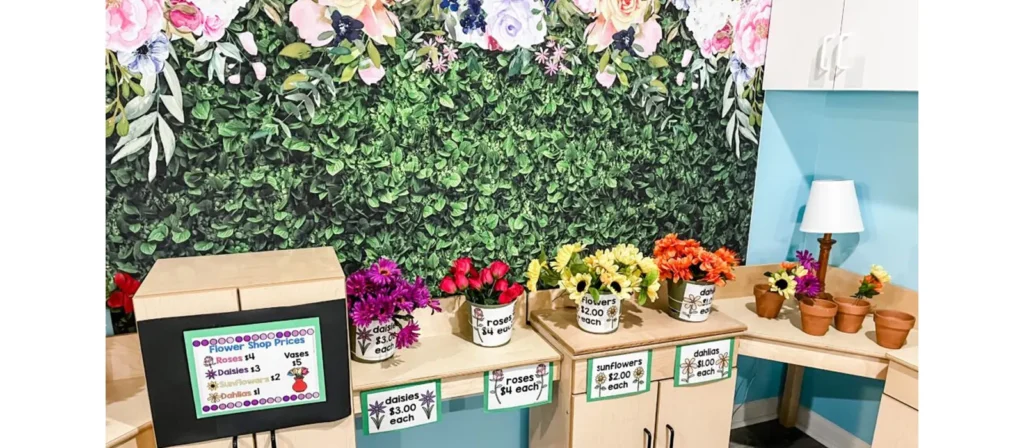
교육적 가치:
This activity fosters creativity, pattern recognition, and basic numeracy through arranging, labeling, and “selling” floral products. Children expand their vocabulary related to colors, flowers, and emotions, while also engaging in social interaction through customer role-play. It introduces early business concepts, such as pricing and transaction exchange, and refines fine motor coordination with hands-on floral work and gift-wrapping tasks.
3. 우주극 아이디어
- 골판지 상자나 담요를 이용해 로켓 모형을 만들어 보세요. 아이들은 우주비행사, 임무 통제관, 외계인 탐험가가 되어 볼 수 있습니다. 이 놀이는 아이들의 상상력, 문제 해결 능력, 그리고 사회적 상호작용을 향상시켜 줍니다.
- 아이들에게 헬멧, 망원경, 우주 지도와 같은 "우주 장비"를 제공하세요. 아이들은 새로운 행성을 탐험하고, 외계 생명체를 만나고, 새로운 세계를 발견하는 임무를 수행하면서 팀워크와 탐험에 대해 배울 수 있습니다.
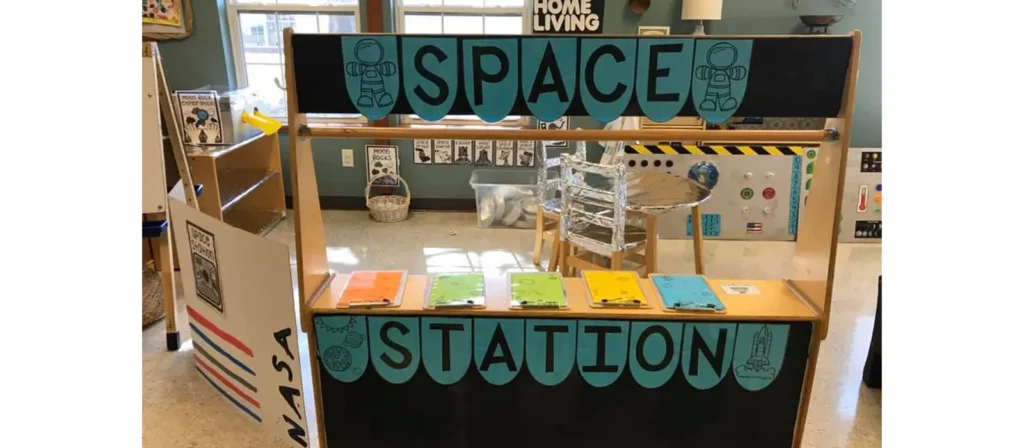
교육적 가치:
Space-themed dramatic play encourages abstract thinking, spatial reasoning, and early scientific inquiry as children explore planets, stars, and missions. It builds vocabulary related to astronomy and space exploration while strengthening collaboration through team-based roles such as astronauts, engineers, and aliens. This type of imaginative play nurtures curiosity, narrative development, and cognitive flexibility.
4. 식료품점 연극 아이디어
- 고객 및 계산원 역할: 한 아이는 손님 역할을 맡아 장을 보고, 다른 아이는 계산대 직원 역할을 맡아 계산하고 돈을 다루는 놀이를 할 수 있습니다. 이를 통해 아이들은 의사소통, 수학, 사회성 기술을 익히는 데 도움이 됩니다.
- 쇼핑 목록: 아이들에게 사야 할 물건의 사진이나 이름이 적힌 쇼핑 목록을 주세요. 이렇게 하면 아이들이 읽기와 분류 연습을 하면서 물건을 찾고 찾는 능력을 키울 수 있습니다.
- 선반에 물건을 채우다: 아이들은 매장 직원으로서 번갈아 가며 선반에 상품을 채워 넣을 수 있습니다. 이를 통해 정리 정돈과 책임감을 배울 수 있습니다.
- 포장 및 체크아웃: "쇼핑"을 한 후, 아이들은 식료품을 봉지에 넣고 계산대를 사용하는 연습을 하며, 운동 능력을 개발하고 거래 과정을 이해할 수 있습니다.
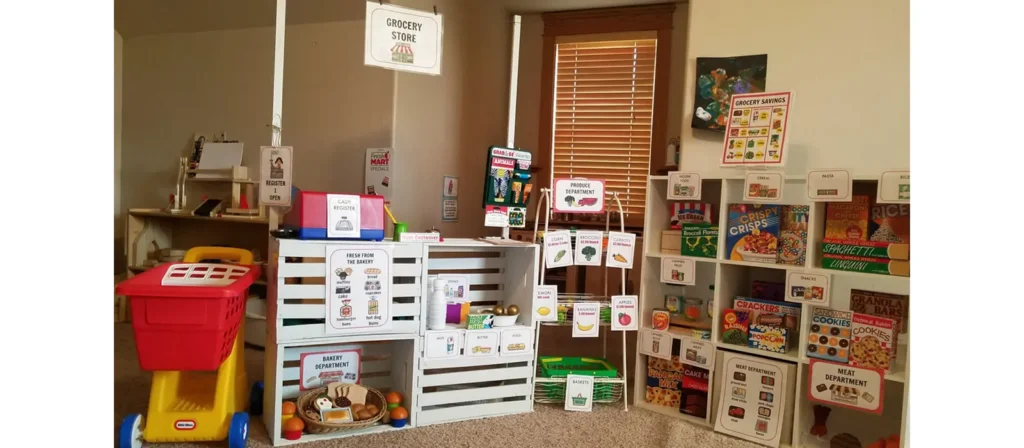
교육적 가치:
A pretend grocery store provides meaningful opportunities for children to practice counting, sorting, and categorizing food items, reinforcing early math and cognitive organization. Functional literacy is supported through reading shopping lists, price labels, and store signage. Children also develop social-emotional competencies such as patience, cooperation, and problem-solving through realistic customer-cashier interactions.
5. 우체국 연극 아이디어
- 작은 테이블을 우체국 카운터로 활용하세요. 상자나 바구니를 우편함의 역할을 하게 하고, 카운터 뒤에는 "우편 배달원"을 위한 의자를 놓으세요.
- 봉투, 엽서, 작은 소포를 준비하세요. 종이나 판지로 "편지"를 만들어 다양한 주소를 적어 보낼 수도 있습니다.
- 스티커나 우표를 사용하여 우편 요금을 표시해 보세요. 아이들은 편지나 소포에 "우표"를 찍으며 소근육 운동 능력을 키울 수 있습니다.
- 가짜 금전 등록기, 우편 배달부 가방, 우편물 분류함 같은 소품을 활용해 보세요. 장난감 전화기를 이용해 전화를 받거나 배달을 할 수도 있습니다.

교육적 가치:
Post office play encourages emergent writing, print recognition, and meaningful literacy experiences as children create and deliver mail. It develops fine motor control through stamping, sorting, and envelope handling, while fostering language growth through the use of addressing, labeling, and messaging. This setting also introduces the role of postal workers and builds awareness of community helpers and communication systems.
6. 슈퍼히어로 연극 아이디어
- 아이들이 좋아하는 슈퍼히어로 의상을 입을 수 있도록 망토, 가면, 방패를 준비하세요. 장애물 코스, 민첩성 테스트, 세상을 구하는 미션 등 다양한 훈련 활동을 직접 만들어 볼 수도 있습니다. 이러한 활동은 신체 활동, 문제 해결 능력, 그리고 팀워크를 향상시켜 줍니다.
- 아이들이 슈퍼히어로 미션을 계획하고 무전기, 지도, 미션 기록을 사용하여 진행 상황을 확인할 수 있는 "미션 컨트롤" 스테이션을 설치하세요. 이를 통해 팀워크, 소통, 그리고 창의적인 스토리텔링이 촉진됩니다.

교육적 가치:
Superhero role-play supports moral development as children explore ideas of fairness, courage, and helping others. It encourages expressive language and narrative thinking through mission-based storytelling. Gross motor skills are enhanced through active movement, while teamwork and leadership are developed in cooperative “rescue” scenarios.
7. 공사 구역 연극 아이디어
- 아이들이 집, 도로 및 기타 구조물을 "건설"할 수 있는 건설 구역을 설정하세요. 블록 장난감 건설 도구도 있습니다. 아이들은 건설 노동자, 건축가, 엔지니어가 되어 모양, 치수, 공학 개념 등을 배울 수 있습니다.
- 아이들에게 건설용 모자, 공구 벨트, 보안경을 제공하세요. 이를 통해 아이들이 안전과 책임감을 강조하면서 건설 현장 작업자나 안전 검사관 역할을 직접 체험할 수 있습니다.

교육적 가치:
Construction-themed play introduces basic engineering principles and spatial awareness as children build and design structures. It strengthens problem-solving and planning abilities while developing gross and fine motor coordination through the use of tools and materials. Social interaction, turn-taking, and cooperation are also reinforced in shared building tasks.
8. 정원 연극 아이디어
- 작은 공간에 조화, 화분, 그리고 갈색 천이나 종이를 사용하여 만든 흙을 준비하세요. "꽃"이나 "채소"처럼 각 식물의 종류별로 구역을 나눠주세요. 아이들은 정원사 놀이를 하면서 꽃을 심고, 물을 주고, 정원을 가꾸는 모습을 상상해 볼 수 있습니다. 또한 정원을 가꾸면서 다양한 식물에 대해 배울 수도 있습니다.
- 어린이용 정원 도구, 물뿌리개, 장갑을 준비하세요. 식물을 "수확"하기 위해 작은 바구니나 봉지를 사용할 수도 있습니다.
- 공간이 허락한다면, 아이들이 가짜 돈과 가격표를 붙여 식물이나 꽃을 파는 놀이를 할 수 있는 작은 "시장"을 만들어 보세요.
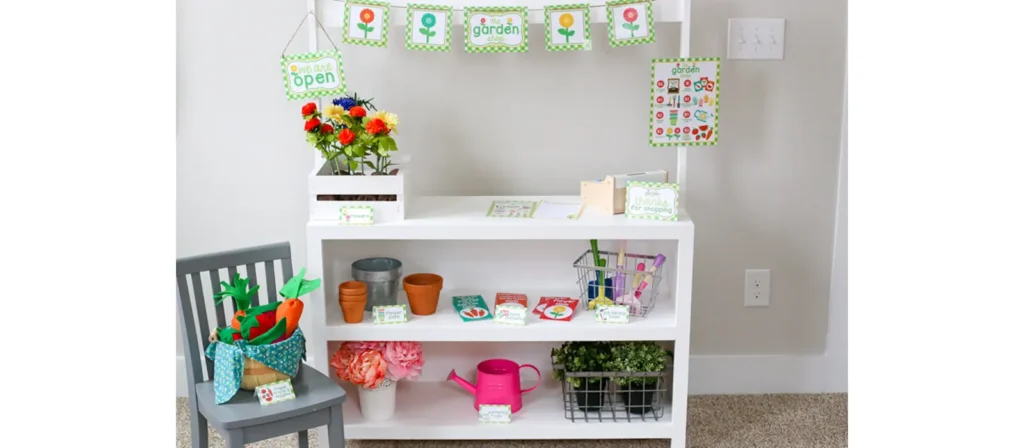
교육적 가치:
Gardening activities nurture responsibility, patience, and an appreciation for nature through role-play focused on planting, watering, and harvesting. Children enhance their understanding of plant life cycles and environmental care while building fine motor skills through digging, pouring, and handling tools. The setting encourages classification, sensory exploration, and early science concepts.
9. 병원이나 의사 사무실 연극 아이디어
- 아이들이 의사나 간호사 역할을 할 수 있도록 장난감 청진기, 붕대, 의사 가운을 준비해 주세요. 아픈 인형이나 봉제 동물을 돌보고, 의료 시술에 대해 배우고, 환자나 간병인 역할을 맡아볼 수 있습니다.
- 아이들이 의사, 간호사, 환자 역할을 하는 "병원 응급실" 상황을 설정해 보세요. 이를 통해 공감 능력, 책임감, 그리고 의료에 대한 기본적인 이해를 증진할 수 있습니다.
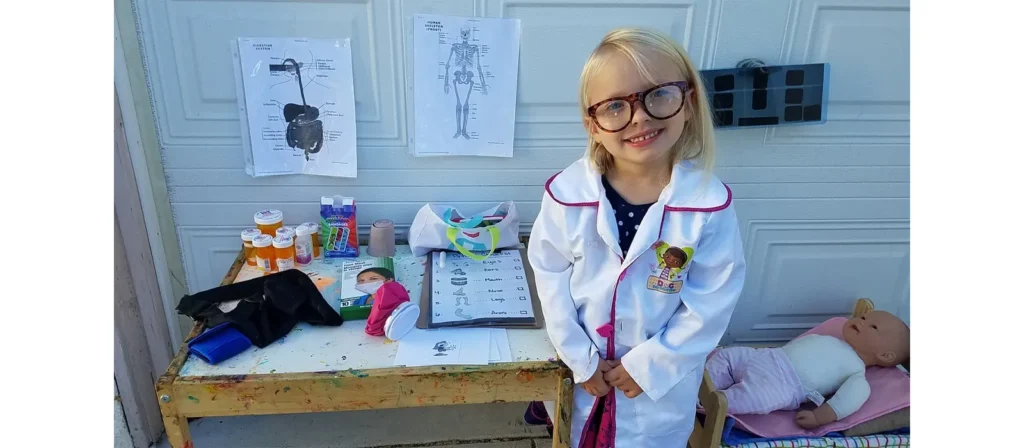
교육적 가치:
Playing doctor allows children to explore health, hygiene, and empathy by caring for patients and learning about the human body. Medical vocabulary is introduced and reinforced, while expressive language is practiced through diagnosis and treatment dialogue. Fine motor control is developed through detailed actions like bandaging or using instruments, and children gain awareness of community health roles.
10. 농장 연극 아이디어
- 장난감 동물(또는 진짜 봉제 동물)과 물뿌리개나 쇠스랑 같은 농기구를 가지고 농장 환경을 만들어 보세요. 아이들은 농부 역할을 맡아 동물을 돌보고, 농작물을 심고, 농장을 관리할 수 있습니다.
- 아이들은 가상 농장 가판대를 설치하여 과일, 채소, 계란 등 자신이 산 상품을 "판매"할 수 있습니다. 이를 통해 농업, 경제, 그리고 책임감에 대해 배우는 데 도움이 됩니다.

교육적 가치:
Farm play introduces children to agricultural processes, animal care, and the farm-to-table concept, supporting science and environmental learning. Children develop social-emotional skills like patience, responsibility, and nurturing behaviors. They also expand vocabulary related to farm tools, animals, and produce while engaging in rich role-play scenarios.
11. 레스토랑 및 카페 연극 아이디어
- 주문을 받기 위한 식탁, 메뉴, 메모장 등을 준비하세요.
- 웨이터와 요리사에게 앞치마와 모자를 제공하고, 근처에 가짜 주방을 만들어 보세요.
- "영업중" 또는 "폐쇄중"과 같은 표시를 추가하고 거래에 사용할 돈을 넣어 두세요.
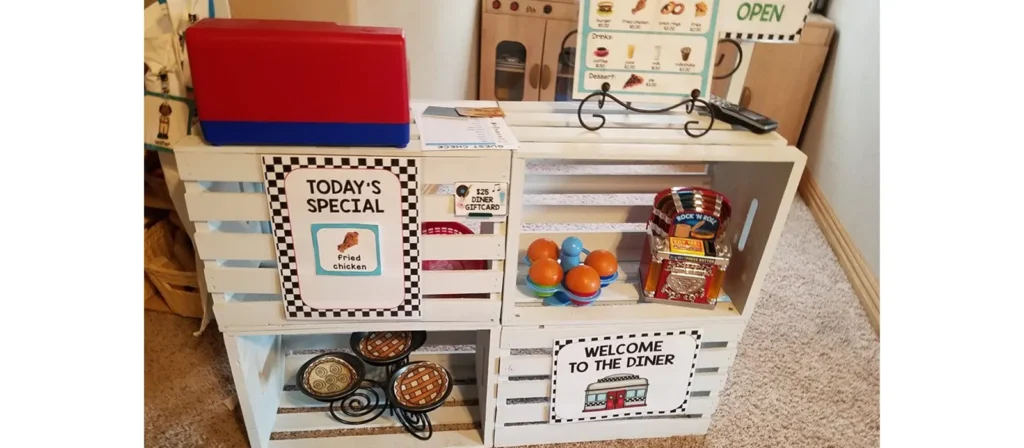
교육적 가치:
Running a pretend restaurant fosters sequencing, memory, and communication as children take orders, serve food, and handle “payments.” It strengthens early math skills through menu prices and reinforces polite social exchanges. Motor skills are enhanced via serving and food preparation, and collaboration is nurtured through shared roles and responsibilities.
12. 동물병원 연극 아이디어
- 봉제 동물을 테이블이나 담요 위에 놓아 돌봄이 필요한 "환자"로 삼으세요.
- 검사와 치료를 위해 장난감 주사기, 체온계, 애완동물 운반대를 준비하세요.
- "체크인", "수술", "회복실"과 같은 스테이션에 라벨을 붙입니다.
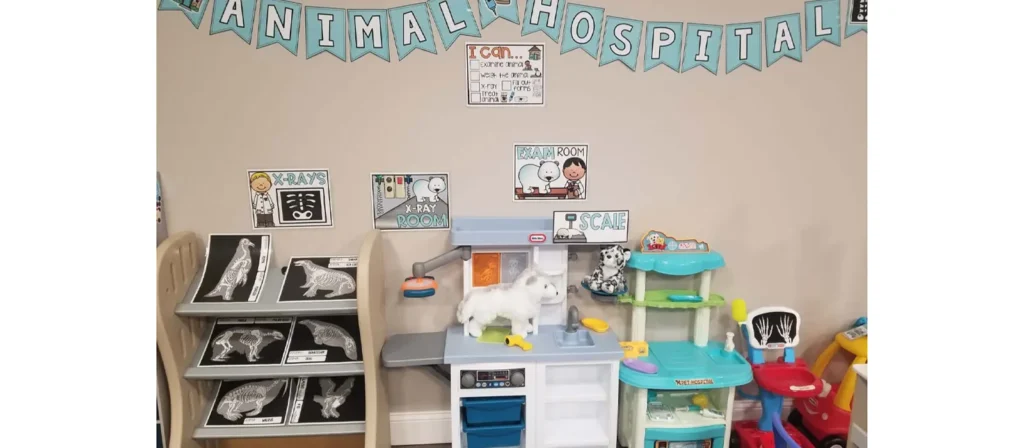
교육적 가치:
This dramatic setting develops empathy, observational skills, and critical thinking as children assess and care for sick or injured animals. Veterinary vocabulary and health concepts are introduced in an age-appropriate way, and fine motor skills are sharpened through the use of medical tools and gentle handling. It encourages role identity and care-based reasoning.
13. 소방서 연극 아이디어
- 빨간 종이 모자, 소방차로 변신한 골판지 상자, 무전기를 이용해 드라마틱한 소방서 분위기를 연출해보세요.
- 아이들이 비상 전화를 받고, 현장으로 달려가고, 상상 속 화재에서 봉제 동물을 구출하는 역할을 하게 하세요.
- 아이들은 롤플레잉을 통해 팀워크, 신속한 의사 결정, 안전 의식을 익히게 되는데, 이는 모두 삶에 꼭 필요한 기술입니다.
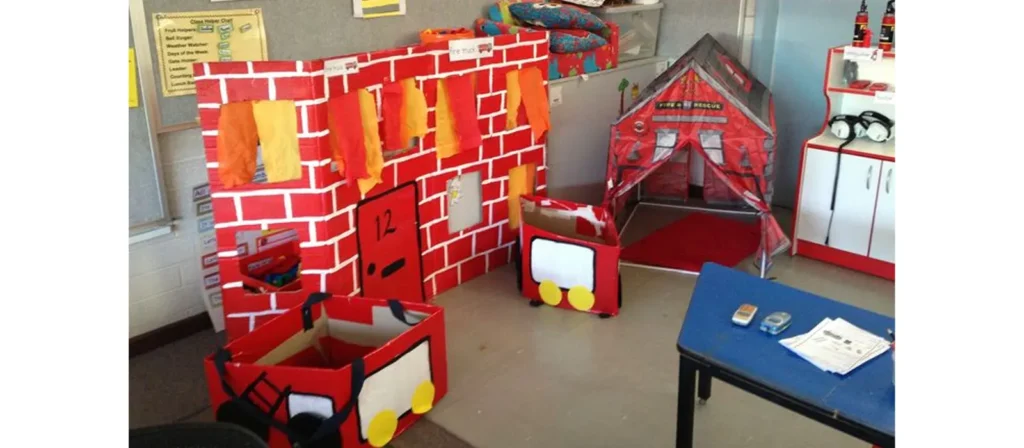
교육적 가치:
Firefighter role-play emphasizes safety education, quick thinking, and physical coordination through emergency response scenarios. It supports understanding of civic duties and introduces vocabulary related to rescue equipment and procedures. Children practice leadership, cooperation, and problem-solving as they take turns acting out heroic rescues and alerts.
14. 캠핑 연극 아이디어
- 텐트나 담요로 요새를 만들고, 손전등을 켜고, 티슈와 종이 타월 롤로 만든 모닥불을 피웁니다.
- 아이들이 가상 배낭을 챙기고, 불 옆에서 이야기를 들려주거나, 꼬치에 마시멜로를 꽂아 "굽게" 해보세요.
- 캠핑 놀이는 스토리텔링, 독립심, 자연에 대한 감사를 장려합니다.

교육적 가치:
Camping scenarios foster independence and self-regulation as children simulate setting up tents, cooking, and exploring nature. It promotes storytelling, sequencing, and imaginative thinking while offering opportunities for group collaboration and discussion. Children also gain early exposure to outdoor safety and environmental appreciation.
15. 보물찾기 연극 아이디어
- 낡아 보이는 종이나 인쇄물을 사용하여 보물 지도를 디자인해 보세요. 방이나 놀이터 곳곳에 작은 보물(장난감 동전, 보석, 장신구 등)을 숨겨 두세요.
- 아이들이 단계별로 숨겨진 상을 찾을 수 있도록 수수께끼, 그림 단서 또는 방향 화살표를 통해 안내합니다.
- 이 활동은 아이들이 지시를 따르고 호기심을 유지하는 데 도움이 되는 동시에 비판적 사고력, 순서 관리 능력, 팀워크를 강화합니다.
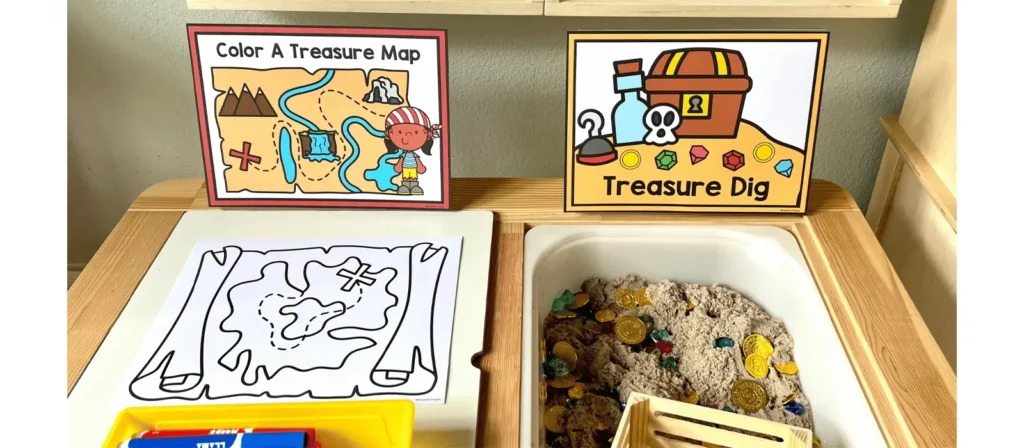
교육적 가치:
A treasure hunt encourages logical reasoning, spatial navigation, and clue interpretation, building foundational problem-solving and critical thinking skills. It strengthens collaboration and communication within teams as children work toward a shared goal. The activity supports perseverance and excitement in goal-directed exploration.
16. 해적선 연극 아이디어
- 아이들은 활기찬 분위기 속에서 롤플레잉과 모험을 통해 의사소통, 리더십, 협력적 스토리텔링을 개발합니다.
- 골판지 상자, 의자, 또는 담요로 만든 요새를 이용해 해적선을 만들어 보세요. 종이 돛, 골판지 조타 장치, 해적 모자도 추가해 보세요.
- 아이들이 선장, 망보는 사람, 항해사 같은 역할을 맡아보게 하세요. 장난감 망원경, 지도, 깃발을 이용해 상상 속의 땅으로 항해해 보세요.
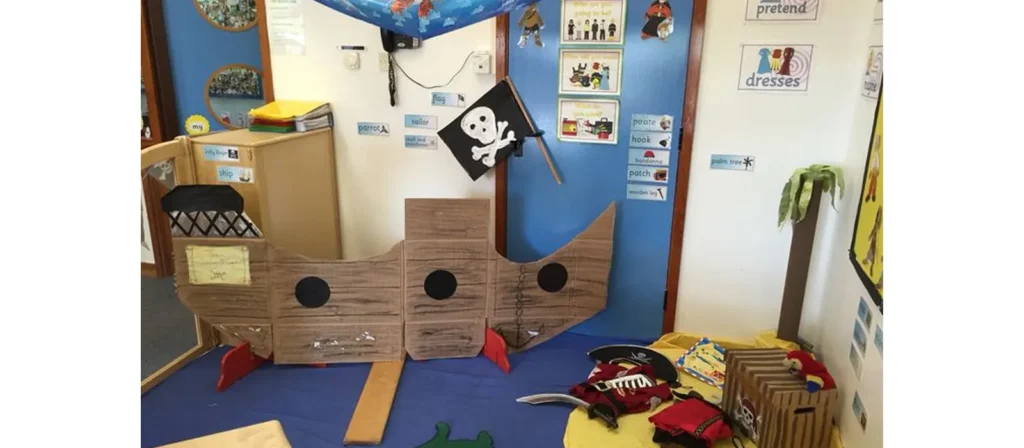
교육적 가치:
Pirate play encourages creative storytelling, leadership, and collaboration as children role-play adventures and navigation. It introduces directionality, map-reading, and symbolic thinking, while also supporting expressive language through dialogue and fantasy. Group dynamics and problem-solving are naturally embedded in shared mission-based play.
17. 도서관 연극 아이디어
- 선반에 책을 쌓아 놓고, 편안한 의자나 독서 매트, 대출 데스크, 도서관 카드를 추가하세요.
- 아이들은 돌아가며 사서 역할을 맡아 책을 정리하고, 대출하고, 정해진 동아리 시간에 이야기를 소리 내어 읽어줍니다. 다른 아이들은 책을 둘러보고 "빌려" 조용히 읽을 수도 있습니다.
- 아이들은 독해 능력을 향상시키고, 알파벳 지식을 연습하며, 지역 사회에서 도서관의 역할과 조직, 규칙에 대해 배웁니다.

교육적 가치:
Library play fosters early literacy, book handling, and story sequencing as children check out, organize, and read books. It promotes understanding of library systems and roles, enhancing vocabulary and print awareness. Children also build patience and responsibility while respecting rules and taking turns in group reading settings.
18. 공룡 발굴 연극 아이디어
- 감각통이나 모래상자에 숨겨진 플라스틱 뼈와 화석을 채워 넣으세요. 붓, 삽, 돋보기도 준비해 주세요. "고생물학자 여러분, 환영합니다!"와 같은 표지판으로 공간을 꾸며주세요.
- 아이들은 탐험 조끼와 헬멧을 착용하고, 화석을 발견하고, 현장 일지나 전시대에 발견 사항을 기록합니다.
- 아이들은 실제 고생물학자들을 모방하면서 기본적인 과학 용어를 배우고, 관찰 기술을 연마하며, 발견의 설렘을 경험합니다.
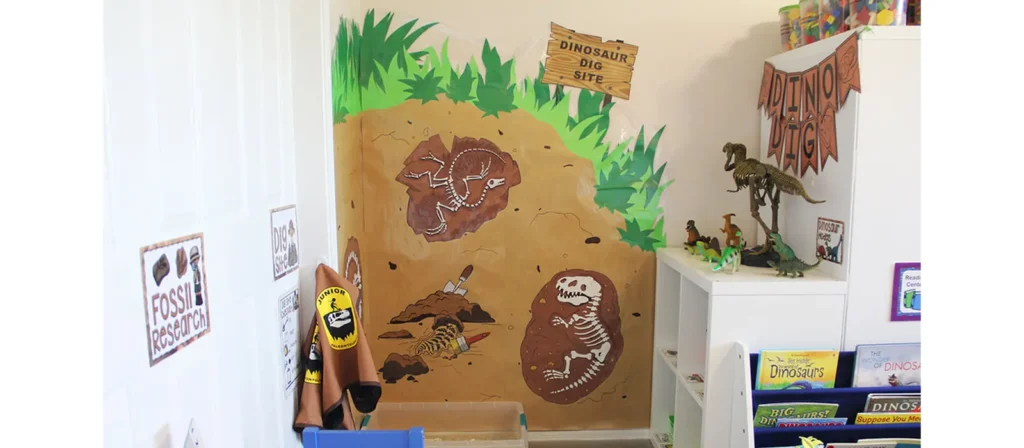
교육적 가치:
Dinosaur-themed excavation introduces children to paleontology, scientific classification, and careful observation. It promotes fine motor development through the use of digging tools and enhances attention to detail during fossil discovery. Children practice documentation and reporting of findings, which supports vocabulary expansion and structured inquiry.
19. 동물원 사육사 연극 아이디어
- 봉제 동물들을 표지판이 붙은 다양한 "서식지"에 배치하세요. 먹이 도구나 사육사 유니폼 같은 소품도 함께 넣어주세요.
- 아이들은 동물원 관리인으로 활동하며 동물들에게 먹이를 주고, 우리를 청소하고, 가이드 투어를 진행합니다.
- 이 연극은 동물 보호, 서식지, 그리고 보존의 중요성에 대한 학습을 장려합니다.
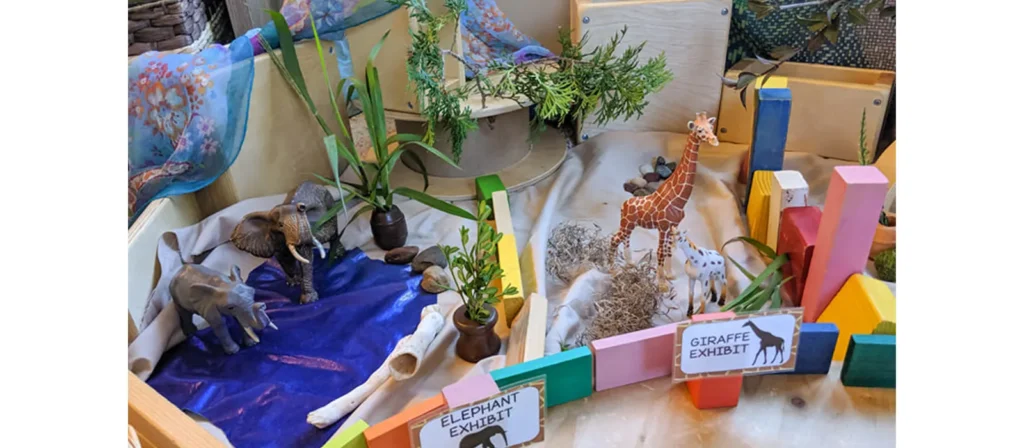
교육적 가치:
Zoo keeper play supports understanding of animals, habitats, and conservation through structured caregiving scenarios. Children expand their biological vocabulary and sense of responsibility while engaging in feeding, cleaning, and habitat creation. The activity also promotes empathy and public speaking through guided “tours” for peers.
20. 기상 관측소 연극 아이디어
- 지도, 날씨 기호, 온도계, 마이크를 포함합니다.
- 아이들은 기상학자가 되어 날씨를 예측하고 예보를 발표하는 역할극을 할 수 있습니다.
- 이 연극은 대중 앞에서의 연설 능력을 향상시키고 날씨 패턴과 기후에 대해 알려줍니다.
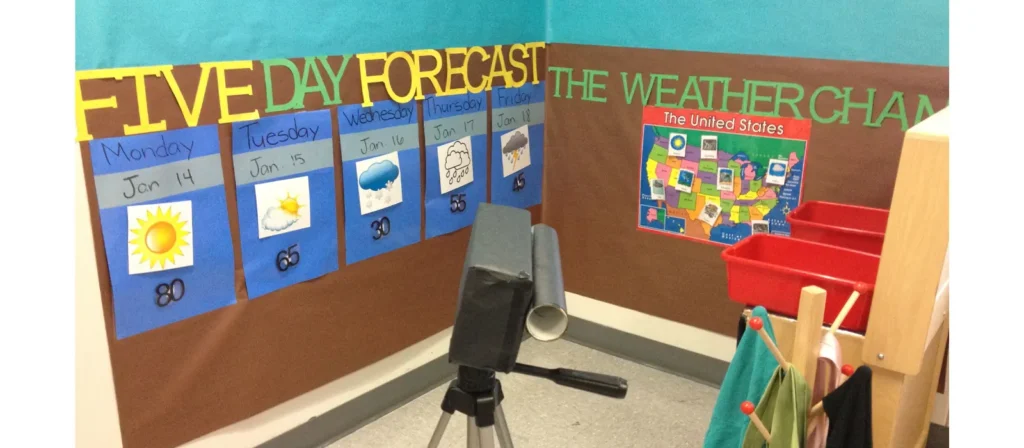
교육적 가치:
Operating a weather station encourages scientific observation, data interpretation, and environmental awareness. Children learn to recognize patterns and make predictions, supporting early inquiry and analytical skills. Language development is enhanced through weather reports and symbolic representations using maps, symbols, and tools.
21. 뉴스 방송국 방송 극적극 아이디어
- 이 활동은 재미있고 체계적인 방식으로 자신감, 어휘력, 대중 앞에서의 연설 능력을 키워줍니다.
- 뉴스 데스크로 사용할 테이블을 마련하고, 마이크, 카메라(실제 또는 가상), 종이 대본을 추가합니다.
- 아이들은 앵커, 리포터, 카메라맨 역할을 맡아 날씨, 속보, 인터뷰 등을 취재할 수 있습니다.
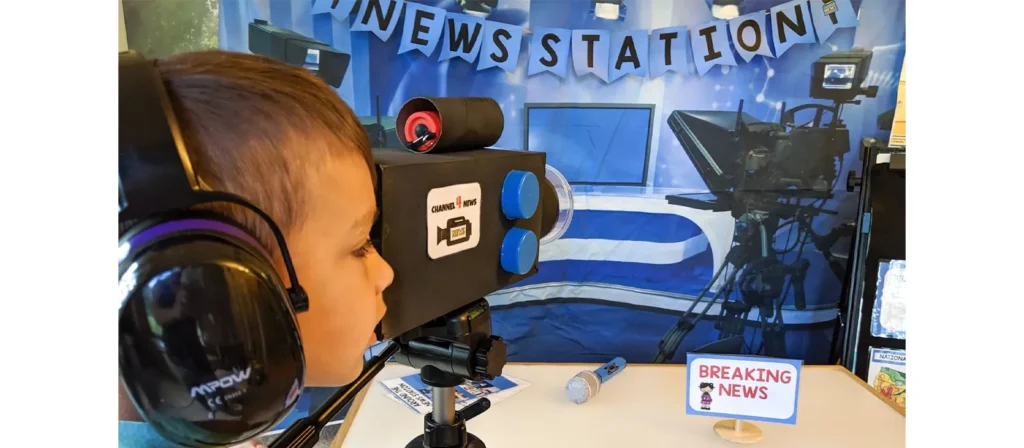
교육적 가치:
Acting as news reporters or anchors strengthens expressive language, narrative sequencing, and confidence in public speaking. Children practice organizing information, summarizing events, and delivering messages. This role-play promotes teamwork and encourages awareness of current events and community happenings.
22. 영화관 연극 아이디어
- 의자를 일렬로 배열하고, 영화 티켓을 인쇄하고, 가짜 팝콘이나 간식을 만들어 보세요.
- 아이들이 "영화"를 연기하고 싶다면 안내원, 티켓 수집가 또는 공연자 역할을 맡도록 하세요.
- 이를 통해 어린이는 시퀀싱, 고객 상호 작용, 공연 예술을 이해하는 데 도움이 됩니다.
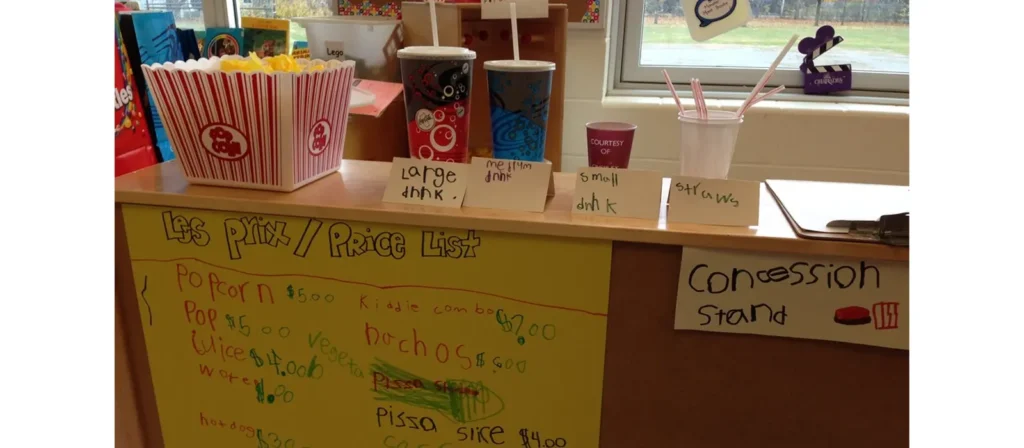
교육적 가치:
Movie theater play enhances sequencing, customer interaction, and dramatic expression through acting, ticketing, and ushering roles. Children practice patience and etiquette as part of an audience, while also developing creative skills in performance and storytelling. Math concepts are reinforced via pricing and role-specific responsibilities.
23. 왕립 왕국 연극 아이디어
- 골판지 성을 만들고, 왕관, 가운, 안전한 재료로 만든 마법 지팡이나 칼을 추가하세요.
- 아이들은 이야기 중심의 모험과 왕족의 책임을 맡으며 왕, 여왕, 기사 또는 용으로 역할극을 즐깁니다.
- 아이들은 기발한 배경 속에서 사회적 역학, 의사 결정, 스토리텔링을 배웁니다.
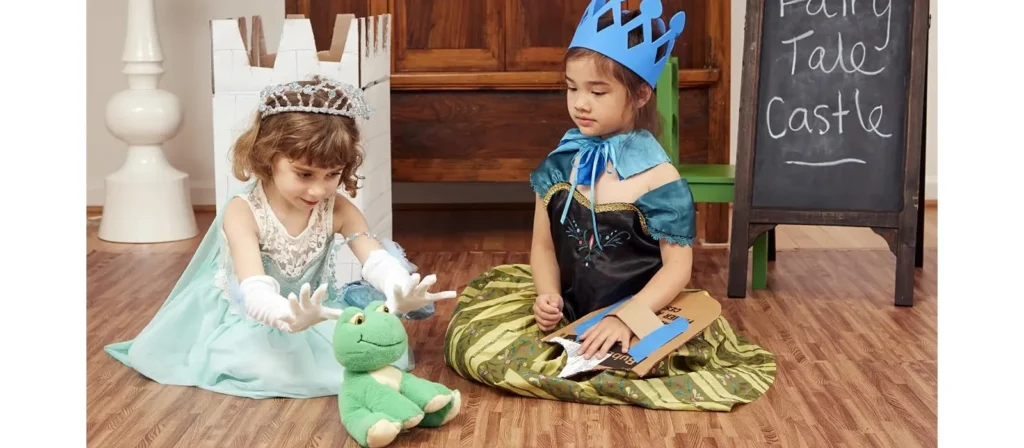
교육적 가치:
Playing with royalty allows children to explore social roles, decision-making, and symbolic rule creation. It fosters rich storytelling, character development, and historical imagination. Social-emotional learning is embedded as children negotiate roles, resolve conflicts, and lead in an imaginative society.
24. 공항 연극 아이디어
- 비행기 객실을 모방하여 의자를 일렬로 배치하고, 여권과 티켓을 비치한 체크인 카운터를 마련하고, "수하물 찾는 곳"과 "보안 검색대"와 같은 구역을 지정하세요.
- 아이들은 조종사가 안내 방송을 하고, 승무원이 간식을 제공하고, 승객이 여행 가방을 들고 탑승하여 다양한 목적지로 가는 가상 비행기를 타는 등의 역할 놀이를 할 수 있습니다.
- 이 연극은 어린이들에게 공항 절차, 지리, 세계 문화를 소개하는 동시에 대기, 차례 지키기, 순서대로 단계를 따르는 법을 연습시킵니다.
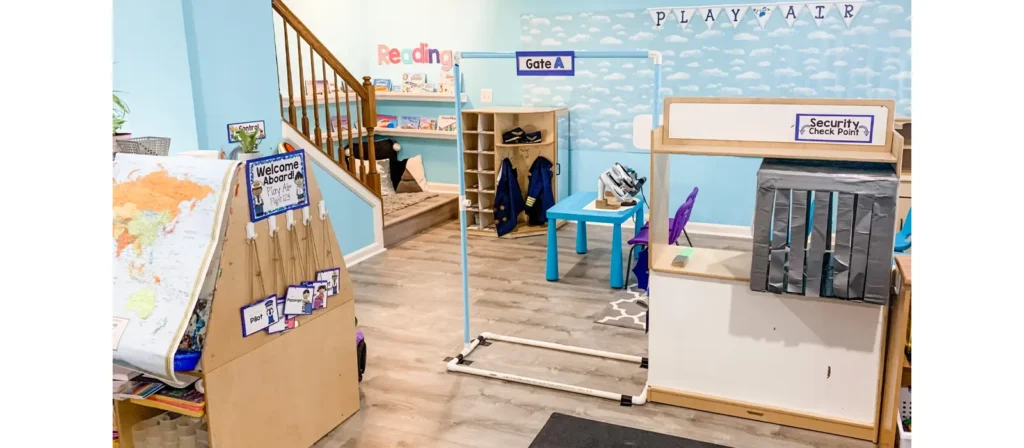
교육적 가치:
Airport play introduces children to travel procedures, sequencing, and cultural geography. It supports role differentiation as they act as pilots, attendants, and passengers. The activity builds patience, order-following, and cooperation, while reinforcing functional literacy through signs, tickets, and boarding procedures.
25. 과학 실험실 연극 아이디어
- Use child-sized lab coats, goggles, droppers, beakers, and colorful liquids (like water with food coloring) to set up a pretend science lab.
- Let children role-play as scientists, mixing “chemicals,” conducting safe experiments, and recording results in notebooks.
- Add charts, magnifying glasses, and observation cards to simulate real scientific procedures.
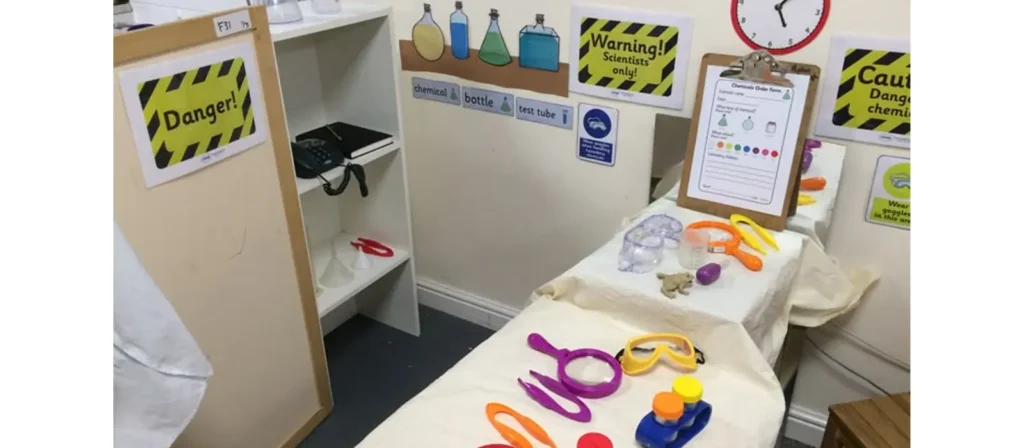
교육적 가치:
Science lab play encourages inquiry, experimentation, and hypothesis formation. Children develop scientific vocabulary and logic as they explore cause-and-effect through safe, pretend experiments. Fine motor skills are refined with tools and mixing tasks, while observation and documentation practices are introduced in age-appropriate ways.
26. 음악 밴드 공연
- Provide a variety of musical instruments such as tambourines, maracas, drums, xylophones, and keyboards.
- Allow children to take on roles as band members, singers, or conductors, and rehearse together for a performance.
- Add elements like a “stage,” audience seating, and costumes to encourage creative expression and group participation.
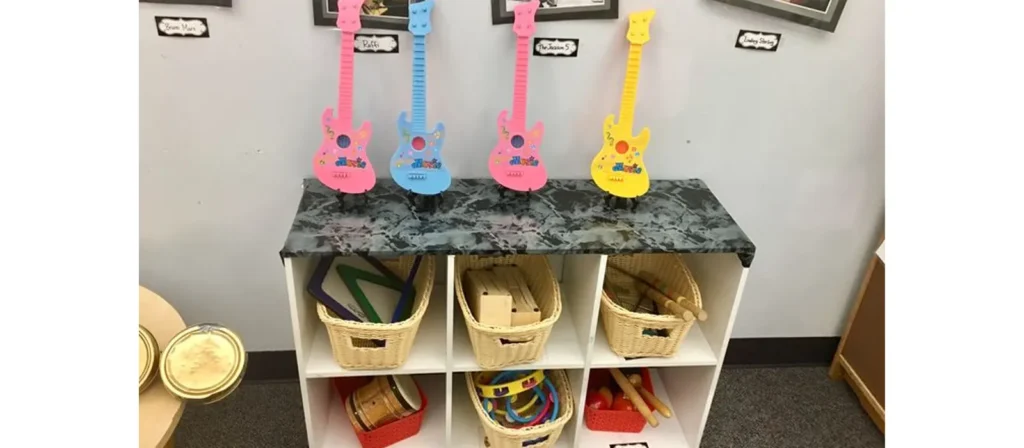
교육적 가치:
Music band play builds rhythm recognition, auditory discrimination, and timing. Children practice coordination and self-expression through instruments and performance. Group music-making encourages cooperation, turn-taking, and shared creativity, while also fostering appreciation for sound, tempo, and cultural diversity.
Creating a Dramatic Play Area
A well-designed dramatic play area serves as the heart of imaginative exploration in any early childhood environment. Whether in a classroom, playroom, or home setting, this space invites children to enter new roles, tell stories, and make sense of the world around them through role-play. Below are essential components and professional tips to help you set up a vibrant, developmentally supportive dramatic play space.
1. Choose a Defined, Flexible Space
Designate a specific area for dramatic play that is separated from quieter activities like reading or puzzles. This helps children mentally shift into “imaginative mode.” Use low shelves, rugs, or curtains to define boundaries. The space should be flexible enough to accommodate rotating themes like kitchens, doctor’s offices, or space stations.
2. Provide Open-Ended Props and Realistic Materials
Stock the area with a mix of open-ended materials (like cardboard boxes, scarves, and wooden blocks) and realistic props. Items don’t have to be expensive—many can come from recycling bins or donation drives. Choose materials that can be repurposed for multiple themes to spark creativity.



3. Include Literacy and Numeracy Elements
Enhance the learning potential of your dramatic play area by embedding opportunities for reading, writing, and counting. Examples include:
- Menus, shopping lists, appointment books
- Price tags, clocks, and play money
- Maps, signs, tickets, and labels
These items help children naturally engage with academic concepts during pretend play.
4. Rotate Themes and Materials Regularly
To keep interest high and expand children’s learning experiences, change the dramatic play theme every few weeks. Involve children in deciding what the next theme should be—it empowers them and increases engagement. Some common rotations include:
- Grocery Store
- Animal Hospital
- Camping Adventure
- Weather Station
- Pirate Ship
5. Support Inclusive and Culturally Relevant Play
Ensure the space reflects a variety of cultures, family types, and community roles. Include diverse costumes, dolls with different skin tones, and signage in multiple languages. Dramatic play should provide opportunities for every child to see themselves and others positively represented.
6. Prioritize Safety and Cleanliness
All props and furniture should be age-appropriate, non-toxic, and free of sharp edges. Regularly check for wear and tear and sanitize frequently touched items. Use soft furnishings, rounded corners, and ensure easy access to prevent accidents and promote independence.
전체 카탈로그를 받아보세요
문의 사항이나 견적 요청이 있으시면 메시지를 보내주세요. 저희 전문가가 48시간 이내에 답변해 드리고, 원하시는 제품을 선택하실 수 있도록 도와드리겠습니다.
극적 연극의 도전 극복 아이디어

1. 자원이나 재료 부족
One of the most common challenges in dramatic play is the lack of materials to support the activity fully. Whether it’s missing props, costumes, or play items, children might struggle to engage in specific scenarios without the right tools.
해결책: Get creative with the resources you already have. Household items like cardboard boxes can turn into stoves, refrigerators, or cars. Old clothes can be repurposed as costumes, and simple toys like wooden spoons or plastic containers can be used for cooking or grocery shopping. Additionally, encourage children to create their materials. For example, they can make their menus, price tags, or even flowers out of paper or fabric. This solves the material issue and fosters creativity and problem-solving skills.
2. 짧은 주의 지속 시간
어린아이들은 종종 극적인 놀이 상황에 장시간 집중하는 데 어려움을 겪습니다. 역할을 자주 바꾸거나 아예 흥미를 잃을 수도 있습니다.
해결책: 놀이 시간은 짧고 역동적으로 유지하세요. 아이들이 역할이나 시나리오를 원활하게 전환할 수 있도록 활동을 관리하기 쉬운 부분으로 나누세요. 예를 들어, 20분 동안 계산원 역할을 하는 대신 몇 분 간격으로 다른 역할을 번갈아 맡도록 하세요. 이렇게 하면 더욱 새롭고 흥미진진한 놀이를 즐길 수 있습니다. 또한, 놀이 중간에 깜짝 손님이나 "특별 배달"과 같은 새로운 요소를 추가하여 흥미를 유발하고 참여를 유지할 수 있습니다.
3. 아이들 사이의 갈등
극놀이는 종종 공간과 역할을 공유하기 때문에 아이들 사이에 갈등이 발생할 수 있습니다. 누가 어떤 역할을 맡을지, 어떻게 게임을 진행해야 할지에 대한 의견 충돌은 놀이의 흐름을 방해할 수 있습니다.
해결책: 아이들이 협력하고 역할을 협상하도록 격려하세요. 차례를 지키거나 소품을 공유하는 등 명확한 기본 규칙을 정하는 것도 갈등을 예방하는 데 도움이 될 수 있습니다. 갈등이 발생하면 아이들에게 문제 해결 전략을 안내해 주세요. 예를 들어, 함께 문제를 해결하는 방법을 묻거나 새로운 역할을 제안해 보세요. 사회정서적 학습은 극적 놀이의 핵심이므로, 이러한 순간들을 활용하여 공감, 존중, 팀워크를 가르치는 것이 중요합니다.
4. 제한된 사회적 상호 작용
극놀이는 사회성을 발달시키는 데 도움이 되지만, 일부 아이들은 이러한 활동 중에 또래와 상호작용하는 데 어려움을 겪을 수 있습니다. 아이들은 수줍음, 두려움, 또는 다른 사람들과 어떻게 어울려야 할지 몰라 어려움을 겪을 수 있습니다.

해결책: Set up the dramatic play scenario to naturally encourage group participation. For instance, instead of having one cashier and one customer, set up a larger grocery store or restaurant where multiple children can take on different roles simultaneously (e.g., cashier, customer, stocker, manager). This encourages children to interact in a less intimidating environment. Additionally, scaffolding the play by suggesting dialogue or prompts can help children who are hesitant to speak or take the lead.
5. 롤 플레이의 어려움
아이들은 극놀이 중에 특정 역할을 맡는 데 어려움을 느낄 수 있습니다. 의사, 요리사, 선생님처럼 행동하는 법을 모르거나, 놀이 상황에서 자신의 책임에 대해 확신이 없을 수도 있습니다.
해결책: Provide simple role cards or scripts outlining each role. For example, a “doctor’s role card” might include phrases like “How are you feeling today?” or “Let me check your temperature,” which will guide children in their role-playing. Modeling behaviors and providing real-life examples, such as pretending to be a customer at a restaurant or a teacher in a classroom, can also help children become characters. Creating a safe environment where they feel comfortable experimenting with different roles without fear of making mistakes is essential.
6. 선택에 압도되다
극놀이는 종종 다양한 선택지를 제시하는데, 이는 때때로 아이들을 압도할 수 있습니다. 아이들은 어디서부터 시작해야 할지 모르거나, 다양한 역할과 시나리오 중에서 하나를 선택하는 데 어려움을 겪을 수 있습니다.
해결책: 선택지를 좁히고 더욱 체계적인 놀이 환경을 만드세요. 예를 들어, 레스토랑 테마를 가지고 있다면 "셰프", "서빙 담당자", "손님"과 같은 역할을 제안하여 놀이에 집중할 수 있습니다. 또한, 아이들이 새로운 상황을 단계별로 접하도록 유도할 수 있습니다. 아이들에게 탁 트인 "건설 현장"을 제시하는 대신, 먼저 집이나 다리와 같은 특정 구조물을 짓는 데 집중하다가 아이들이 익숙해지면 놀이를 확장할 수 있습니다.
7. 과도한 시뮬레이션 또는 과소 시뮬레이션
어떤 아이들은 주변 환경이 너무 복잡하고, 부담스럽고, 조용하고, 자극이 부족하다고 느낄 수 있습니다. 자극 수준이 너무 높으면 극적 놀이가 덜 즐겁고 생산적이지 못할 수 있습니다.
해결책: 놀이 공간의 자극 수준을 조절하세요. 너무 어수선하다면 소품 수를 줄이거나 방해 요소를 최소화하여 환경을 단순화해 보세요. 공간이 너무 조용하다면 배경 음악, 새로운 시나리오, 소품 추가 등 새로운 요소를 추가하여 아이들의 참여를 유도하세요. 중요한 것은 공간이 적절하게 느껴지도록 하는 것입니다. 너무 과하지 않으면서도 상상력과 학습을 장려할 만큼 자극적이어야 합니다.
8. 놓친 학습 기회
어른의 지도가 없다면 아이들은 연극 놀이가 제공하는 교육적 기회를 최대한 활용하지 못할 수도 있습니다. 놀이에 너무 빠져들어 숫자 세기, 의사소통, 지시 따르기 같은 핵심 기술을 연습할 기회를 놓칠 수도 있습니다.
해결책: 교사나 진행자는 놀이를 주도적으로 이끌어가기보다는 부드럽게 이끌어 주세요. "사과를 몇 개 사고 싶니?" 또는 "병원에 도착하면 가장 먼저 무엇을 할 거야?"와 같은 개방형 질문을 하세요. 이는 아이들의 비판적 사고를 촉진하고 학습 목표를 강화합니다. 놀이 중에 아이들이 읽기, 수학, 문제 해결 능력을 발휘하도록 돕는 교육용 소품(장난감 돈이나 레시피 카드 등)을 활용할 수도 있습니다.
9. 일관되지 않은 참여
집단 활동에서 모든 어린이가 연극 놀이에 참여하고 싶어하는 것은 아니며, 특히 주제에 익숙하지 않거나 활동과 단절되어 있다고 느끼는 경우 일부 어린이는 참여를 거부할 수 있습니다.
해결책: 좀 더 친숙한 요소를 도입하여 거부감을 보이는 아이들을 격려하세요. 예를 들어, 테마가 "레스토랑"인데 아이가 잘 모르겠다면, "집밥"처럼 아이에게 친숙한 것으로 시작하여 점차 더 정교한 역할극으로 이끌어 줄 수 있습니다. 모든 아이들이 환영받고 편안하게 참여할 수 있도록 환영하는 분위기를 조성하세요. 간단한 시범이나 소규모 그룹으로 시작하더라도 좋습니다.
Frequently Asked Questions About Dramatic Play
- What is another word for dramatic play?
Dramatic play is often referred to as pretend play, imaginative play, or role play. These terms are used interchangeably to describe activities where children act out scenarios using their imagination and social understanding. - At what age should children start engaging in dramatic play?
Children as young as 18 months begin to imitate simple actions, like pretending to talk on the phone. Around age 2 to 3, they enter the symbolic play stage, where they start creating structured pretend scenarios. By preschool age (3–5 years), dramatic play becomes more complex, incorporating storytelling, collaboration, and themed environments. - What are some examples of dramatic play settings?
Common dramatic play settings include pretend kitchens, grocery stores, doctor’s offices, post offices, restaurants, science labs, construction zones, music stages, and more. These scenarios mimic real-life environments or imaginative worlds (like pirate ships or royal kingdoms) and provide opportunities for diverse developmental benefits. - Can dramatic play be integrated into academic learning goals?
Absolutely. Dramatic play supports multiple academic domains: math (through pricing, counting, measuring), science (via experimentation, observation), and literacy (through signs, lists, role-based communication). With intentional planning, educators can align play scenarios with curriculum standards while keeping learning playful and child-centered. - Is dramatic play still valuable for older children (ages 6+)?
Yes. While the style of play becomes more narrative and structured, older children still benefit from role-play in the form of skits, creative writing, mock interviews, or historical reenactments. It continues to support empathy, communication, perspective-taking, and even leadership skills, especially when integrated into project-based learning. - How do children’s roles evolve during dramatic play?
Younger children often imitate familiar routines, while older children create more complex narratives, assign roles, and develop rules or scripts. Role flexibility also increases, showing cognitive growth and social maturity.
결론: 상상력의 힘 발휘
연극 놀이는 아이들의 창의력, 학습, 그리고 개인적인 성장을 촉진하는 강력한 도구입니다. 정원사, 의사, 가게 주인 등 상상 속 인물을 연기하며 즐거움을 선사하고 중요한 발달 기술을 향상시킵니다. 역할극을 통해 아이들은 새로운 개념을 탐구하고, 문제 해결 능력을 키우며, 의미 있는 사회적 상호작용을 경험합니다.
상상력은 단순히 재미만을 위한 것이 아닙니다. 공감, 자신감, 그리고 문제 해결 능력을 키우는 열쇠입니다. 이러한 창의력을 함양함으로써, 우리는 아이들이 자신감과 연민을 가지고 세상을 헤쳐 나갈 준비가 된, 다재다능하고 사려 깊고 호기심 많은 사람으로 성장하도록 돕고 있습니다.




